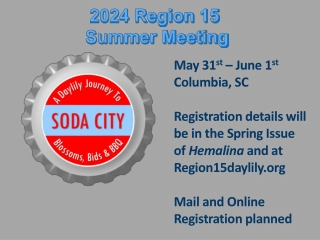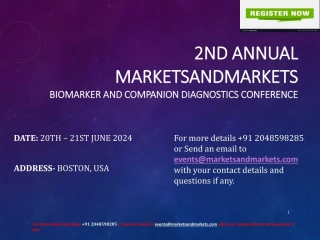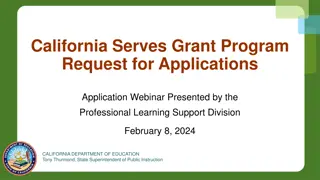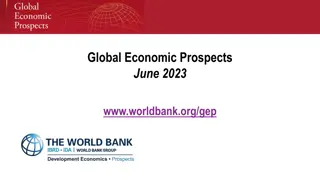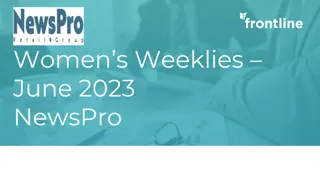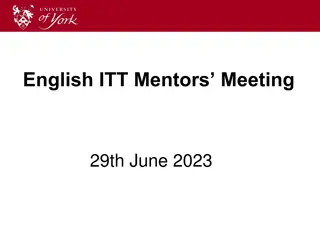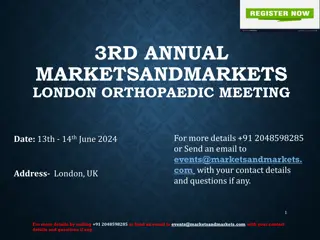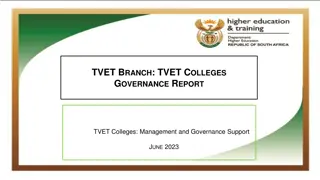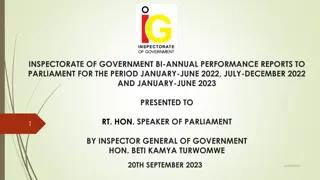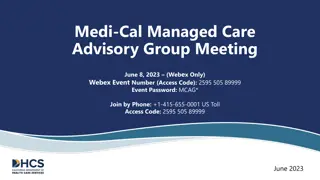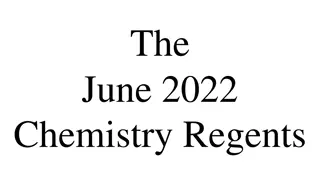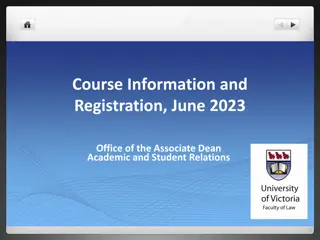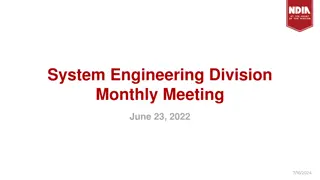
Restructuring Modules for Health and Hospital Management Program at IIHMR New Delhi
"Reviewing and restructuring of modules for the first and second year hospital stream of the Post Graduate Diploma in Health and Hospital Management at IIHMR, New Delhi. The study aims to align course content with industry requirements for developing future healthcare leaders in the 21st century."
Download Presentation

Please find below an Image/Link to download the presentation.
The content on the website is provided AS IS for your information and personal use only. It may not be sold, licensed, or shared on other websites without obtaining consent from the author. If you encounter any issues during the download, it is possible that the publisher has removed the file from their server.
You are allowed to download the files provided on this website for personal or commercial use, subject to the condition that they are used lawfully. All files are the property of their respective owners.
The content on the website is provided AS IS for your information and personal use only. It may not be sold, licensed, or shared on other websites without obtaining consent from the author.
E N D
Presentation Transcript
REVIEW AND RESTRUCTURING OF MODULES OF FIRST YEAR AND SECOND YEAR (HOSPITAL STREAM) OF POST GRADUATE DIPLOMA IN HEALTH AND HOSPITAL MANAGEMENT AT IIHMR, NEW DELHI
BACKGROUND The endeavours was to review the content of various modules of First and Second year hospital stream and restructure the same. The review was carried out by undertaking a study of the course objective, learning objective and syllabus plan of each of the modules. These were weighed against current needs within the health care sector, as well as, the sequence of flow so as to ensure good comprehension by the students. In doing so the views of current first and second year students was taken and an interaction was carried out with interviewers of the Industry who recruit our students to ascertain from them the current requirement of the industry and how well could the students be prepared to meet these. A comparison of the syllabus with a few of the other institutes who provide similar training was also carried out so as to ensure that the Institute s curricula was better than the others.
STUDY OBJECTIVE Review and suggest overlapping of topics across modules, separately for Year 1 and Year 2 (all the three streams Health, Hospital and Healthcare IT - separately) Review and suggest addition/deletion of topics for each module, separately for Year 1 and Year 2 (all the three streams Health, Hospital and Healthcare IT - separately) Suggest appropriate sequencing of various modules, separately for Year 1 and Year 2 (all the three streams Health, Hospital and Healthcare IT - separately) Suggest addition of new modules/deletion of existing modules, keeping in mind current health/hospital/healthcare IT management policy and practices, separately for Year 1 and Year 2 (all the three streams Health, Hospital and Healthcare IT - separately) Syllabus and course content need to be designed keeping in mind the current requirements of healthcare industry 4
AIM To prepare health care leaders to meet the health challenges of the twenty first century by developing an innovative program through review and merit based restructuring of the curricula of Post Graduate Diploma in Hospital and Health Management(PGDHM) at IIHMR, New Delhi
STUDY METHODOLOGY Informal interaction with First and Second year students to obtain their views on the syllabus To understand the sectoral trend, secondary data search using the internet to obtain and compare the syllabus with that of certain reputed national and international institutes Telephonic interaction with placement interviewers to ascertain requirements, whether students met them and how to better prepare them to meet the needs of the industry Analytically detailed study of the current curricula with reference to the objective
ANALYSIS AND RESEARCH The study was conducted by analysing the modules that are on offer by IIHMR, New Delhi and those offered by others, if there are any overlapping topics presently being covered in the various modules, the topics that need to be deleted, topics/modules that can be added or deleted and the sequence of flow of modules. The study will be conducted through secondary review and personal interaction.
VIEWS OF PLACEMENT INTERVIEWERS Bookish knowledge; weak expression in some cases Students lacked self-confidence Students lacked in practical application of knowledge, e.g. How to establish a Health Camp? Students were unable to handle situational leadership requirements i.e. they were unable to think and apply themselves to handling tight, suddenly emerging situations through innovative/ out of box solutions Students were lacking in general awareness about the health care sector and were unaware and not up to date with the latest developments Students were weak in Biostatistics and basic understanding of Epidemiology
VIEWS OF STUDENTS Conduct of two modules simultaneously to break monotony and keep interest alive Shorter syllabus of modules with 1.5 Credit Score to facilitate learning Increase duration of modules of Hospital Planning, Biostatistics, Research Methodology and Epidemiology Greater use of pedagogical tools Conduct of class on facing an interview and mock interviews Topics which are similar should follow each other Cover modules from which interview questions are usually framed during latter part of the first year and the early part of the second year
PROCESS Comparison of the syllabus at IIHMR, New Delhi with: - TISS Symbiosis AIIMS AMITY Harvard Johns Hopkins Views of placement agencies
RESULTS/DISCUSSION TISS Covers hospital management without foundation of health administration (offers a different course on health management) Student s employability restricted to a particular stream MBA in Health and Hospital Management Exhaustive (46+3 Electives) since combined, tenuous comprehension Health divorced form Hospital stream during the second year at IIHMR Symbiosis Yale and Harvard Different since cater to national needs, international students (strike balance) and restructuring as per recommendations of guidelines for 21st Century Nothing related to hospital covered since course is for health management Johns Hopkins Reasonably similar to IIHMR especially MBA in Health Care Management
RESULTS/DISCUSSION Similarity of modules across national/international institutes, to a large extent, but not in all cases. What is being done differently in foreign institutes is Less course content in depth education and better comprehension More class based seminar/discussions, in addition to industry based existence
RESULTS/DISCUSSION Common differences from IIHMR syllabus are modules on Leadership Innovative Problem Solving and Thinking Negotiation and Conflict Resolution Emerging Trends in Health Care Determinants of Health Ethics in Public Health and Social Justice
RESULTS/DISCUSSION INCLUSION OF MODULES Include Leadership and Innovative Thinking, Negotiation and Conflict Resolution and Emerging Trends/ Current Happenings in the Health Care Sector Inclusion will also meet the aspirations of placement interviewers viz students lacking in situational leadership and knowledge of current happenings Mock Interviews
RECOMMENDATIONS: DELETION OF MODULES Modules no longer viable/are repetitive to find time for inclusion of modules while ensuring India centric syllabus, India s needs being different from developed nations Delete Health Information Management Principles of Management (only repetitive topics) Ungraded Modules viz Human Process Lab Communication Lab Essentials of Computer Service
RECOMMENDATIONS: ADDITION OF NEW TOPICS Addition of New Topics and Reason for the Same Artificial Intelligence Manpower Audit in Hospital Communication Planning and Management Designing and Implementing Health Campaigns Designing campaign messages Piloting and implementing Evaluating and maintaining a campaign Assignment Team Project To Memo and E Mail writing add writing of Business Letters Minutes, Notices and Reports Laws of Contract and its Management Topics shall also be included on account of new modules of Leadership, Negotiations and Conflict Resolution and Emerging Trends in Health Care
EXPERT COMMITTEE Industry Experts Dr. J.N Srivastava (NHSRC) Dr. J.K. Das (NIHFW) Dr. S.B. Arora (IGNOU) Dr. Dharmesh Lal (PHFI) Dr. Markandey Rai (Indira Gandhi Technological and Medical Sciences University)) Dr. Ashish Choudhary (Akash Healthcare) Dr. Ashish Roy (AIIMS) Dr. Shyama Nagarajan (SahaManthran Pvt. Ltd.) Dr. Poonam Rajput (Morpheus Healthcare Pvt. Ltd.) Dr. Gaurav Pal Tomar (IQVIA)
EXPERT COMMITTEE IIHMR Faculty Dr. Sanjiv Kumar, Director, IIHMR Dr. Pradeep Panda Dr. A.K. Khokhar Dr. Anandhi Ramachandran Dr. Preetha, G.S. Dr. Sumesh Kumar Dr. Nitish Dogra Dr. Manish Priyadarshi Dr. Nishikant Bele
FEEDBACK: INDUSTRY-ACADEMY INTERACTION Students should be trained in soft skills for better work efficiency and for developing work attitude. Student s training is also required as per work profile assigned by the employer for better results; Employers have a moral responsibility to provide opportunities to the students to learn Students should be trained to work on the grass root level and there is need to strengthen their basics To enhance up-to-date knowledge among students in the healthcare sector, the institute should invite external experts from bio-tech, pharma, hospitals, start-ups (health applications) to speak on emerging themes Thinking power/questioning attitudes of the students need to be developed Logical Approach- How should I logically approach a problem? Training on writing and research methodology would help There is need to provide hands-on knowledge of basic computer learning to every student (e.g., excel, power-point) The gap between industry requirement and skills of the students should be narrowed down. Focus on practical hands-on experience in consulting and hospitals during the last three months of the course The hospital management syllabus is vast, almost equivalent to a three-year MBA programme; Strike a balance between theoretical knowledge and application Add modules on conflict resolution and motivations in HRM, procurement principles, legal aspects, and ethics.
FEEDBACK: INDUSTRY- ACADEMY INTERACTION Student s expectations should also be met by the institute Students should be trained to work for longer hours Repeated topics in different modules should be deleted. There are considerable overlaps of topics across modules. More emphasis should be given on the designing and planning of healthcare systems as it has been done in the syllabus of AIIMS Students should be clear about their goals and objective of pursuing the course at IIHMR Student s absenteeism should be minimized Student s should be highly motivated in taking initiatives and for working 24x7 environment; a culture of openness needs to be inculcated Students should be aware of every operations in a hospital; it may be small or big. Most students lack awareness about the functioning of various departments in a hospital. It is important for the students to learn the application of the knowledge they gain during the course. IIHMR should need to work in this regard. More field-visits to hospitals may help
FEEDBACK: INDUSTRY- ACADEMY INTERACTION Before start of any module it is important to explain to students the importance of the module for them so that they can concentrate more on the subject. Ownership skills should be developed in the students so that they can start taking responsibility Students should be given projects based on their specialization. The summer training of the students should be disseminated Students can be sent to the hospitals for the analysis of the problems hospitals face. Peer learning should be developed. Students should be grouped for different assignments in such a way that their learnings are maximized. Communication skills also need to be brush up Students should be motivated to attend the classes. Internal evaluation could be based on the completion of relevant online courses by the students
CONCLUSION Endeavours to review the content of various modules of first and second year hospital stream and restructure the same. The review was carried out by undertaking a study of the course objective, learning objective and syllabus plan of each of the modules. These were weighed against current needs within the health care sector, as well as, the sequence of flow so as to ensure good comprehension by the students. In doing so the views of current first and second year students was taken and an interaction was carried out with interviewers of the Industry who recruit our students to ascertain from them the current requirement of the industry and how well could the students be prepared to meet these. A comparison of the syllabus with a few of the other institutes who provide similar training was also carried out so as to ensure that the Institute s curricula was better than the others.


